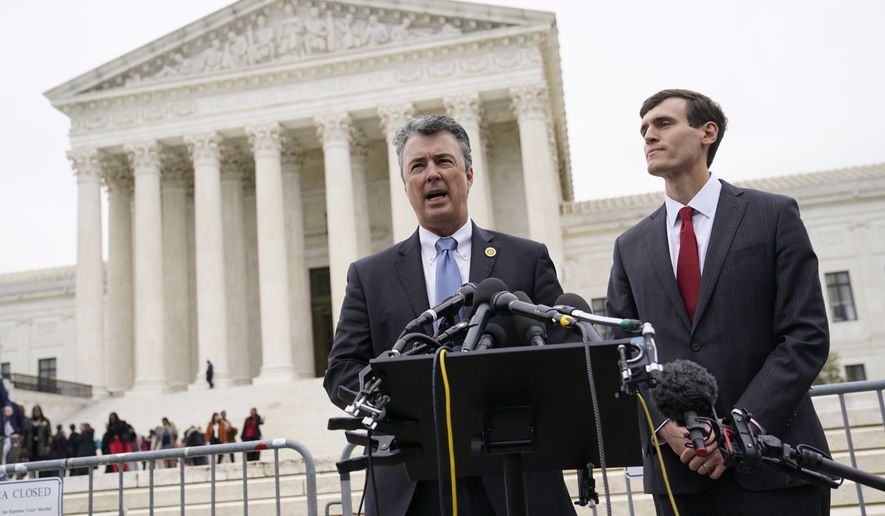The Supreme Court’s three liberal justices on Tuesday slapped down Alabama’s argument in a Voting Rights Act case that it had drawn its congressional map with a race-neutral lens.
The state took its battle to the Supreme Court after voting-rights advocates charged that Republican lawmakers packed Black-dominated areas into a single district to dilute their representation.
Black people make up 27% of Alabama’s population but are the majority in only one of the state’s seven House districts.
A three-judge panel had struck down the map, which had been redrawn after the 2020 census. The lower court directed the state to create a new map that has two majority-Black districts.
The state maintains its map was drawn without using race as a factor and forcing the state to make a new map at the lower court’s direction would force it to inject race into the redistricting process.
Justice Elena Kagan pushed back against Alabama’s claim its assessment was race neutral, saying the state wants the court to upend precedent on the Voting Rights Act, which was enacted to protect voters of color from discrimination.
“Under our precedent, it is kind of a slam dunk,” Justice Kagan said. “You’re asking us to cut back basically on our 40 years of precedent.”
Under an emergency request to the justices earlier this year, though, the majority of the high court said the state’s current map — with just one majority-Black district — could be used in this year’s elections while the litigation is ongoing.
There was no clear signal from the court’s conservative majority that they were ready to upend the precedent.
Justice Samuel A. Alito Jr., who appeared open to the state’s defense of its map, was at one point critical of Alabama’s argument, calling it “far reaching.”
The legal battle concerns Section 2 of the Voting Rights Act, which is aimed at banning discrimination when implementing voting rules. The court will ultimately decide whether Alabama can implement a “race neutral” congressional map or if it must take minority representation into consideration.
Justice Sonia Sotomayor pointed out the state’s Black community “has been split three or four different ways.”
And Justice Ketanji Brown Jackson chastised Alabama Solicitor General Edmund LaCour Jr.’s argument that their map was race-neutral.
“Why are you saying it’s a neutral plan?” Justice Jackson said. “We are talking about a situation in which race has already infused the voting system.”
Mr. LaCour said the state is split between Section 2 of the Voting Rights Act and the Equal Protection Clause of the Constitution in being forced to inject race into its redistricting calculations.
“It puts us in an obvious rock and a hard place,” he said.
Alabama Attorney General Steve Marshall has defended the map, saying it was cleared by a bipartisan group of lawmakers.
“The Voting Rights Act does not force states to sort voters based on race,” Mr. Marshall told The Associated Press. “The VRA is meant to prohibit racial gerrymanders, not require them.”
Rep. Terri Sewell, Alabama Democrat, has represented the state’s only majority-Black district since 2011.
The practice of gerrymandering — drawing maps to benefit the party doing the line-drawing — facing partisan and racial challenges for decades.
While the centuries-old practice has been used by both parties as control of state legislatures has permitted, Republican-dominated Alabama has one of the most gerrymandered maps in the U.S., according to the AP.
The Voting Rights Act ensures that communities of color can elect a representative of their choosing, but when communities of color have their vote diluted, whether by being scattered into different districts or by being packed into as few as possible, that can run afoul of the federal law.
If the high court would curtail Section 2, voting-rights advocates said it could result in less minority representation in Washington.
Abha Khanna, a voting rights attorney with Elias Law Group, told the high court that if it ruled for Alabama, the state’s approach to map drawing would take the country back in time.
And U.S. Solicitor General Elizabeth Prelogar emphasized that Black voters are significantly underrepresented.
“Alabama is asking the court to radically change the law,” Ms. Prelogar said.
A ruling in favor of Alabama, though, would not be the first time the Roberts court limited the reach of the Voting Rights Act.
In 2013, the court ruled 5-4 that Section 5 of the Voting Rights Act ran afoul of the Constitution. Section 5 required certain states with a history of discrimination to get federal approval before altering voting laws and requirements.
• Alex Swoyer can be reached at aswoyer@washingtontimes.com.




Please read our comment policy before commenting.